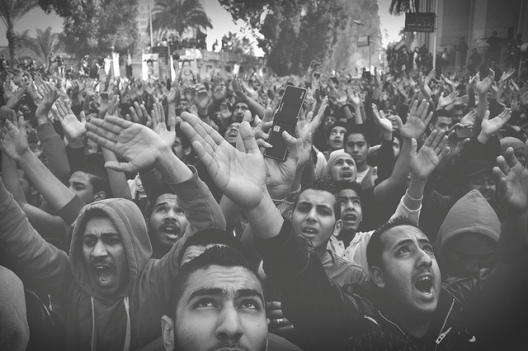 Catch up on the latest out of Egypt every week, with analysis, news updates, photos, videos, and more.
Catch up on the latest out of Egypt every week, with analysis, news updates, photos, videos, and more.
“We ordered him not to appear in the media and to get out of the scene, in order not to give anyone a chance to use his words as an excuse for saying that he supports the use of force.” – Al Jama’a al-Islamiya’s Aboud al-Zomour on Tarek al-Zomour who faces an arrest warrant for allegedly inciting violence. [Time]
“Every herd of sheep follows its shepherd. We have two herds of sheep in this country right now.” Muhammad Kalfat, a 32-year-old literary and academic translator. [Al Jazeera America]
- Anti-Coup Alliance continues calls for rallies; Brotherhood cries foul over prison deaths
- Technical committee to propose radical changes to Egypt’s 2012 constitution
- ‘Friday of Rage’ leaves 173 dead, thousands wounded
- Muslim Brotherhood Supreme Guide Arrested, to stand trial August 25
- Morsi accused of complicity in 2012 protest deaths: sources
- Egypt security forces kill journalist after curfew starts
- Islamist alliance encourages civil disobedience in Egypt
- Court orders Mubarak’s release, Egypt’s prosecutor will not appeal
- United States takes tougher line with Egypt but denies aid cut
- Articles in the constitution committee’s draft rejected by NSF, Nour Party
- Egypt’s ousted leader Hosni Mubarak released to military hospital
- Over 100 Muslim Brotherhood members arrested across Egypt
- Reshuffle of Egypt’s National Human Rights Council includes activists
- Thousands of pro-Morsi demonstrators take the streets in Egypt amid tightened security
- EU ambassador in Egypt says arms suspension will end ‘as things return to normal’
“The Terrorism is Starting” | Sarah A. Topol, The Slate
The extent of polarization, as described by Sarah A. Topol, is tearing Egypt apart.
“There was a segment of the population that always despised the Muslim Brotherhood. But the numbers demonizing the Brotherhood have quickly mushroomed, especially since the military ousted Morsi a month ago. In [Nadine] Wahab’s opinion, the battle lines were drawn last December when the Brotherhood encouraged its supporters to take the streets to defend the president and attacked a sit-in in front of the presidential palace. The crowds had been peacefully protesting Morsi’s seizure of unchecked power until a new constitution, hastily written by Islamists, was ratified.”
“Perception is more important than facts right now,” she maintains. “It’s a very basic fear…. ” It’s a fear felt by just about everyone.”
“But on the streets, the divide seems to be growing, fed by state media and private channels, which have targeted the foreign media, blaming them for sympathizing with the Brotherhood, ignoring Morsi’s abuses while in power, and failing to cover the Brotherhood camps alleged violence at the Rabaa al-Adaweya mosque and Nadha sit-ins. “
“Although the rallies are now smaller, the situation is by no means under control. …[Author and a friend] both agreed the January 2011 revolution had ended—the feeling of national euphoria and hope for a better, united Egypt was history. We also agreed the Islamists would never forget last week’s violence. “The revolution may be over, but the terrorism is starting,” he said. “
In Egypt, Signs Of Piety Attract Suspicion From Security Forces And Vigilantes | Haitham El-Tabei, Huffington Post
On another aspect of society, Haitham El-Tabei, writes of some of the consequences of the polarization that Topol wrote about in “The Terrorism is Starting,” backlash on people who appear to be Muslim Brotherhood, even if they only apparent by their looks.
“In recent days, overt signs of piety have become all it takes to attract suspicion from security forces at Cairo checkpoints and vigilantes looking to attack Islamists.”
Tabei explains that some have shaved their beards noting that it has become a liability for their survival.
“One Western news photographer decided to shave his beard after being repeatedly accosted in the street and even threatened by Egyptians who mistook him for a member of the Muslim Brotherhood.
Mohammed Ibrahim, a pharmacist who also has a beard, has changed his route to work and the hours he keeps in order to avoid “tension with the popular committees.”
“As the crackdown continues, reports have suggested that some preachers have even offered religious dispensation to the faithful who want to shave their beards to avoid being targeted.”
A protester holds up three photos of Gamal Abdel Nasser, Anwar Sadat, and Abdel Fattah al-Sisi taken by Mohamed Azazy.
On August 23 2012, ex-President Mohamed Morsi intervened in a court decision to extend the detention of Islam Afifi, the editor-in-chief of the privately owned Al-Dostour newspaper, by issuing the first law since he assumed legislative powers. Afifi had been charged with spreading false information and insulting the president. Morsi passed a law banning the detention of journalists over offenses related to published material. Afifi was released.
Published on July 19, the anti-military campaign “Kazeboon,” founded when the Supreme Council of the Armed Forces was in power, released a film in Arabic documenting the violence of the police and the military over the last two years since the January 2011 revolution. The video also highlights the relationship between the military and the Muslim Brotherhood, throughout the transitional phase and during Mohamed Morsi’s year in power. Although published a month ago, the video is a third voice that often is not heard.
Source: Shorouk
Translation: [Mubarak] “Either me or chaos.” [Morsi] “Either me or terrorism.”
Image: Photo: Mohamed Azazy
